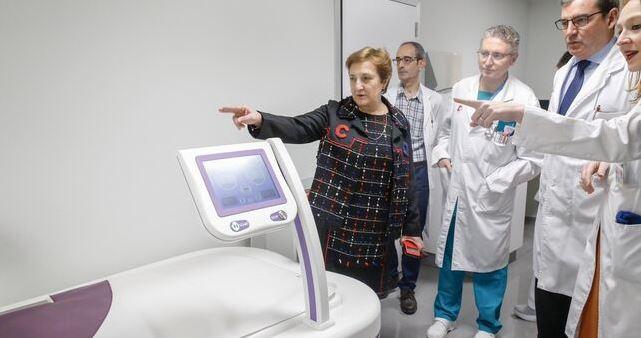Valdecilla has become the first public hospital in Spain to have an oncothermia device within a radiotherapy service. Now they can treat tumors with bad prognosis. The Minister of Health, Ms. Luisa Real, visited the hospital to see the new equipment which is used now for patients with brain, rectal and pancreatic tumors.
The new oncothermia device was installed in the Oncotherapeutic Radiology Service of the Valdecilla hospital, which allows the combined treatment of oncothermia and radiotherapy.
Oncothermia has been proven to be effective in solid tumors with bad prognosis, such as glioblastoma (brain tumor), advanced rectal cancer and pancreatic cancer.
“It contributes to improving the survival time in certain tumors, although all the professionals hope to be able to apply these treatments in the rest of the tumor lesions” said the Minister of Health.
The Valdecilla Radiotherapy Oncology service thus became one of the few centers in Spain that applies all available radiotherapy oncology treatments. This means that all citizens will have access to these treatments without having to leave Cantabria, the counselor added.
During the visit, Real was accompanied by the HUMV manager, Julio Pascual; the head of the Radiation Oncology Service, Pedro Padra; the Head of the Service Section, Juan Cardenal, and the medical specialist, Elisabeth Arrojo.
HETEROGENEOUS HEAT TO DESTROY TUMOR CELLS
Oncothermia applies selective heat through electromagnetic field that heat only the tumor cells which destroys the malignant cells without side effects. The heat sensitizes the tumor lesions and helps to brings more oxygen to the malignant cells, which makes them less resistant to radio and chemotherapy.
“It is an advanced treatment with respect to conventional hyperthermia that has been used up to now by hospitals”, explained Dr. Elisabeth Arrojo.
One of the first applications that will be carried out, as explained by Arrojo, will be on glioblastomas, tumors that affect patients, who have poor prognosis and where other treatments obtain limited results.
Also, as Dr. Cardenal has explained, it will be applied in digestive tumors, specifically in the pancreas and rectum, “to enhance the effects of radiotherapy and chemotherapy and, even, in the rectum, exploring the possibility of doing conservative treatments that avoid surgical intervention”.
At this point, Dr. Pedro Padra has concluded that “we have the best-equipped Radiation Oncology Service in Spain.”






